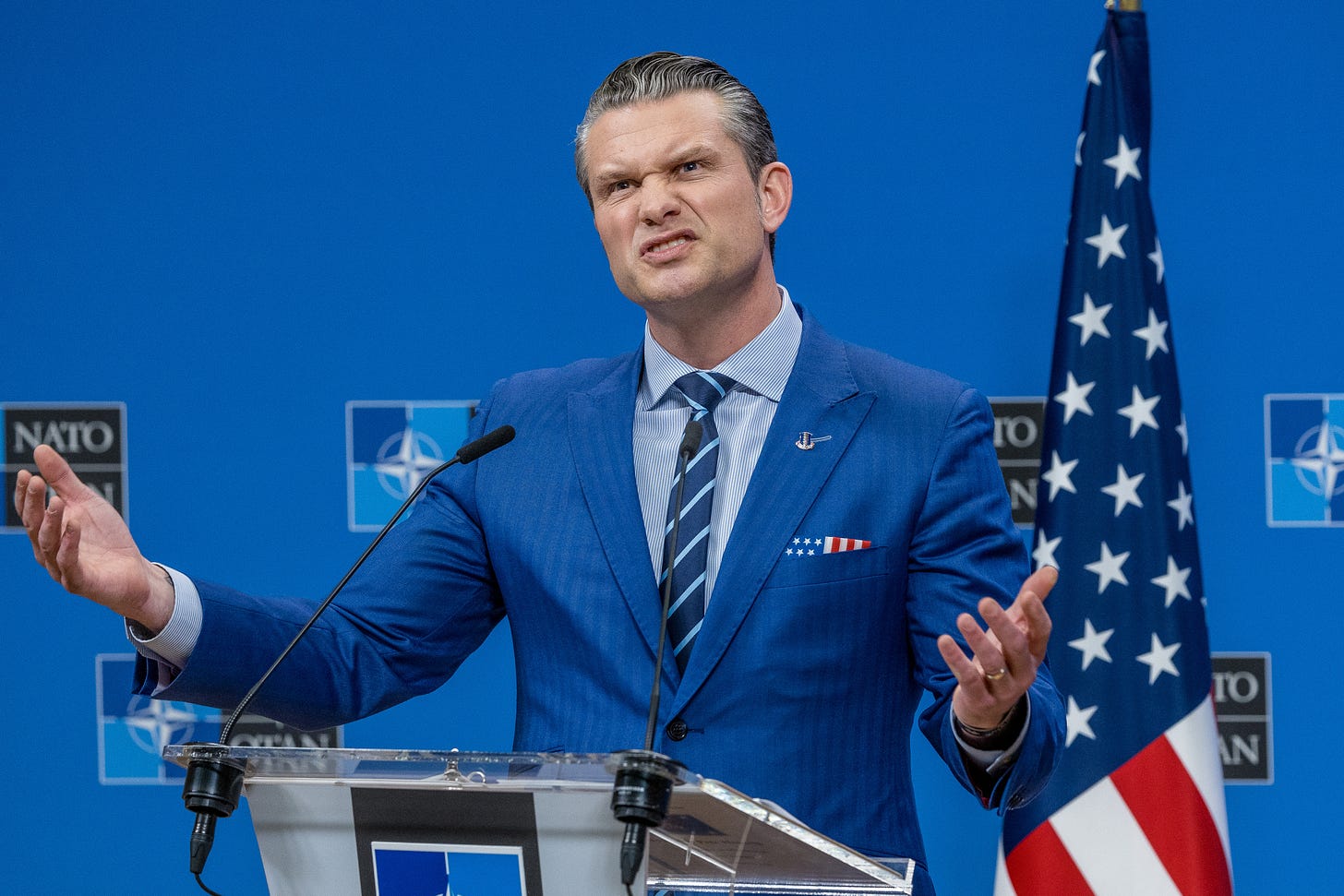Hegseth to Europe: Don’t Look to America for Leadership
And to Ukraine: Don’t look to us for help.

FOR MORE THAN FOUR CENTURIES, the principal geopolitical concern of Americans has been the European great-power balance. The Jamestown colony was sited to defend against the threat of Spanish raiders. Throughout the eighteenth century, settlers on the frontier demanded the conquest of Canada—or “New France,” as it was known in Paris. In many ways, America’s formative military experience was not the revolution of 1775–1783 but the French and Indian War of 1754–1763, part of the worldwide Seven Years’ War between the United Kingdom and France over colonial dominance. Twice in the twentieth century, American soldiers crossed the Atlantic to beat back German bids for European hegemony. From 1945 to 1991, the United States led a coalition of freedom-loving allies to contain and then to liberate the Soviet Empire. The result has been an unprecedented era of peace, prosperity, and liberty.
The long peace is on the verge of ending. Speaking at a meeting of the Ukraine Defense Contact Group—the American-led consortium of 57 countries and the European Union cooperating to provide the Ukrainian military with weaponry and logistics support—new Defense Secretary Pete Hegseth basically told the Europeans, We’re outta here!
The headlines focused on what Hegseth described as his “realistic assessment of the battlefield” in Ukraine. In practice that meant throwing Kyiv’s principal war aims—restoration of its 2014 borders and a quick path to NATO membership—in the trash. “Chasing this illusory goal,” declared Hegseth, “will only prolong the war and cause more suffering.” So much for the secretary’s vaunted “warrior ethos” or for striking a hard bargain in any negotiations with Russia; the Trump administration is Vladimir Putin’s most valuable asset.
More ominous still was Hegseth’s announcement that the European peace, so expensively bought and so long maintained, is no longer an American security priority. His purpose in attending the meeting was to “directly and unambiguously express that stark strategic realities prevent the United States from being primarily focused on the security of Europe.” The Trump administration prefers to “recogniz[e] the reality of scarcity . . . focus on the security of our own borders . . . [and] prioritiz[e] deterring war with China in the Pacific.”
In other words, Hegseth not only chooses weakness but embraces it as strategic wisdom. The military scarcity is real: Since the end of the Cold War, successive administrations have shrunk the size of the U.S. armed forces by a third and reduced defense spending as a percentage of GDP by half. Hegseth hectored the Europeans to increase their defense budgets: “President Trump has called for 5 percent [of GDP allocated to defense], and I agree!” In 2024, the Pentagon’s budget represented about 2.7 percent of U.S. GDP. (Five percent of America’s 2024 GDP would indicate a defense budget of close to $1.5 trillion, so let’s see what Donald Trump’s budget request looks like.)
Securing American borders is, and should remain, principally a job for law enforcement because our neighbors are not military threats. Militarizing immigration enforcement is both legally suspect and a waste of precious resources. Using sophisticated and exotic military cargo aircraft—among the military’s most in-demand assets—to deport a few hundred people to the Guantanamo Bay detention camp is the definition of government waste.
AS FOR DETERRENCE, HEGSETH seems to think it’s a line item on a budget rather than an effect created in the mind of an adversary. How do Xi Jinping, Vladimir Putin, or Ali Khamenei assess Trump’s willingness to defend America’s allies? The short-order withdrawals from Iraq and Afghanistan have already raised doubts about American willpower; casting out Ukraine—a nation enduring extreme suffering to retain its freedom and become a liberal society—would have consequences not only in Europe but also for Taiwan and other embattled democracies. It doesn’t take a seasoned expert in alliance management to recognize that lecturing the Europeans to double down and recommit to the fight won’t be convincing if it’s delivered over the shoulder as the American secretary of defense turns tail and runs.
It gets worse. Hegseth suggested that the United States would maintain some nuclear umbrella over the European continent but “require our European allies to step into the arena and take ownership of conventional security on the continent.” The next step in this process most likely would be a withdrawal of U.S. forces now stationed in Europe. This is a recipe for mischief. It goes a long way to undercut the deterrent value of American power while encouraging nuclear proliferation. Extended deterrence—i.e., the nuclear umbrella—rests on the assumption that the United States would be willing to use nuclear weapons in a war in Europe in which its forces were already engaged. With no forces engaged, the reason to use nuclear weapons—or even threaten their use—dwindles, and with no American nukes, others will seek their own.
It should not be assumed that a Europe confident in its ability to protect itself is ipso facto a good thing. European states have a very long history of quarreling with one another; part of the European Union’s success has been that, with the United States and NATO in the background, it has not had to worry about collective security. Who would doubt that in 1914 or 1939, Europe was more than capable of defending itself?
But even—perhaps especially—if the Europeans can hang together and reclaim great-power capabilities, there is no guarantee that Europe’s interests will always and perfectly align with ours. Europeans have tolerated our Middle East adventures, but in no small measure because they thought it would keep NATO strong. Germans, for example, would like to do more business in China and perhaps return to the salad days of cheap Russian energy. Even within NATO, Hungary and Slovakia take their cues from Moscow.
With the Trump administration taking its wrecking ball to the constitutional order here in America, it’s easy to miss the damage being done not only in Europe but elsewhere. It has been difficult enough and costly in blood and treasure to pacify Europe as the foundation for this first liberal international order. Having to start over would be even tougher and more costly.





